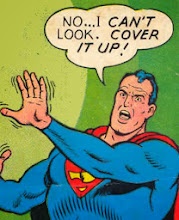Okay, Clark was doing some undercover thing as actor Claude Keith, and Lyrica knows this. That's all the set-up you need, I assure you.
Wow... what a shrew.
The woman who just laughed in your face because she thought you were "a weak jellyfish" is worth any risk? I'm not saying I always fell for girls who were a good match for me (or even particularly nice people), but I'm starting to think Superman has self-esteem issues.
Or as a ring. You know... rings and weddings.
I'm sorry, but have you forgotten how that woman just laughed in your face?
Well, once you told her who you really were, her fate was pretty much sealed. It's more a matter of "how" than "if" at that point.
Wow. And I added nothing by way of taking things out of context. That's exactly how that happened. It happened. We can try to forget about it... and we'll certainly try... but it happened.
See you Monday!



























8 comments:
I think this was the kind of story that they felt they had to run every now and then to prove that Supes was straight, since, in the '50s, a psychiatrist named Fredric Wertham accused DC/National of publishing characters, Batman and Robin, whose relationship contained strong homosexual overtones.
Adam: how do you think the word "choke" sounds? As a writer, I have to decide between words like giggled and, um, chortled. I'm just curious. In the middle of a sentence like that, I would think it comes out like an "erk".
Thoughts?
Ask your doctor, if Lyrica is right for you.
@ wordsmith: Not only, according to Wertham, did exist a "subtle atmosphere of homoerotism which pervades the adventures of the mature ‘Batman’ and his young friend ‘Robin.’" He added, in The Seduction of the Innocent: "The Lesbian counterpart of Batman may be found in the stories of Wonder Woman and Black Cat. The homosexual connotation of the Wonder Woman type of story is psychologically unmistakable. It portrays extremely sadistic hatred of all males in a framework which is plainly Lesbian." Pity that I missed these overtones at that time...
Wayne, I've always liked the word, "BLARG!"
Wordsmith, I'm not saying DC might not promote more romance in a given hero's life if he was accused of being gay or homoerotic. There's a fair chance that's why Batwoman started showing up in the post-Code Batman stories. But since Wertham didn't impute homoeroticism to Superman-- just plain old fascism-- I tend to think DC was just indulging in giving their hero a more active romantic life, as long as they could be sure that the female involved would die, lose her memory, etc.
Gene, Wertham may not have imputed homoeroticism to Superman specifically, but stories in which a "timid" Clark Kent nervously dodges the interests of potential mates, and there were quite a few in the "Superman family" of comic books in the Silver Age (1958-1970), could be interpreted as portraying a homosexual man avoiding the unwanted attentions of a heterosexual woman; of course, we know, even if somehow Wertham didn't, that DC understood that their audience was a bunch of boys who found girls "icky" and who wouldn't have wanted to see their hero starring in a romance comic book.
The jump from Batman and Robin to Superman and his "pal" Jimmy Olsen isn't a large one, especially in the context of Supes dodging the matrimonial intentions of Lois Lane all that time.
I think that DC/National felt forced to, every few years, assure the parents of their readers that Kal-El was a "red-blooded male", and so we get oddly-motivated stories like this one where our hero falls for a woman with few redeeming qualities even while none of it rings true.
I wouldn't put it beyond the realm of possibility that the Wertham publicity might have made DC hyper-aware of their image for a while, though I'm not sure that they would have remained vigilant about everything for so long. OTOH, DC Comics effectively wrote Catwoman out of existence for about the first 12 years of the Code, so certainly some things twisted their knickers.
A caveat, though, is that sometimes superhero comic publishers also used girl characters both to titillate some of the boys-- the ones who didn't find girls entirely icky-- and to appeal to a potential female readership. So while I don't dismiss entirely the "hey, hey, don't say we're gay" stratagem, it's just one thread in the overall design, methinks.
Post a Comment